M otherhood was something Grace Blacklock yearned for, postpartum anxiety and COVID-19 were not. And sadly, this Townsville mum isn’t alone.
Prior to the coronavirus pandemic, it was estimated one in seven Australian women suffered from perinatal anxiety and depression but specialists have seen those numbers soar in recent months.
The Gidget Foundation Australia has experienced a 50 per cent increase in website traffic while PANDA has reported a 20 per cent increase in calls to its national helpline since the coronavirus outbreak.
Ms Blacklock imagined her introduction to motherhood would include mothers’ groups and days spent completely besotted with her baby.
Instead she was diagnosed with postpartum anxiety after her midwife raised concerns during a home visit.
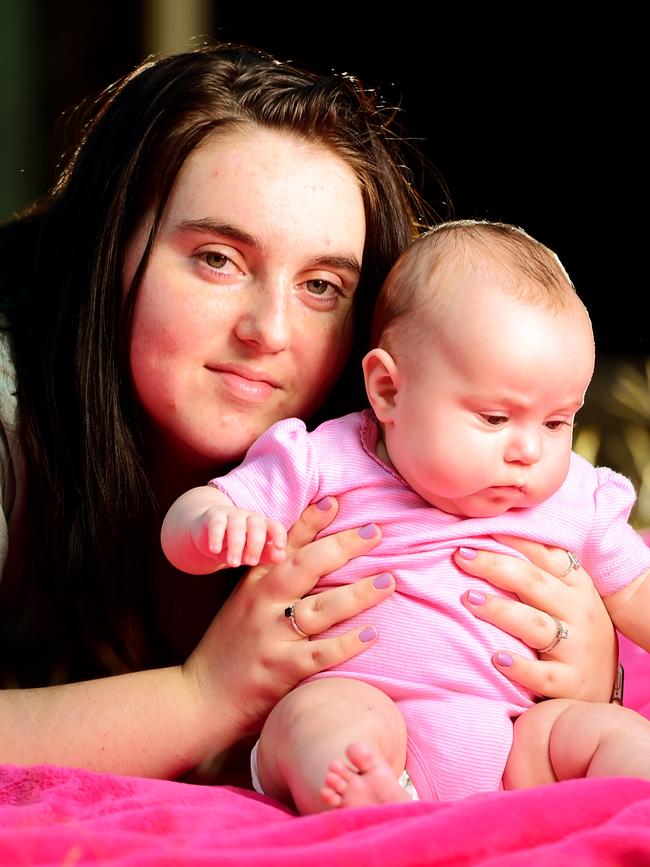
Ms Blacklock considered herself “one of the lucky ones” after receiving care through the Townsville University Hospital’s Midwifery Group Practice but feared that COVID-19 social-distancing measures may have resulted in other women being overlooked due to telehealth appointments replacing face-to-face meetings.
“I said that I felt like I was going to have a panic attack while holding her,” she said.
“I felt like I was a failure for not being the ‘perfect mum’ (and) I know it’s out of my control but sometimes I feel like I don’t deserve to have a baby if I feel this way.
“I was feeling great, now I find myself crying any time of the day, my sleep has suffered and I’m feeling really anxious again to the point I vomit.”
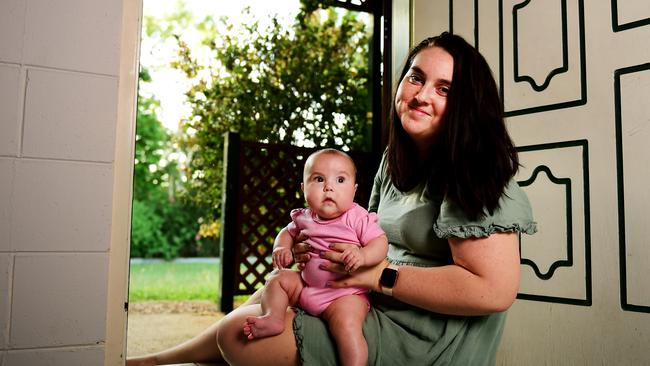
The result of biological, sociological and psychological factors, perinatal anxiety and depression can affect mums and dads.
It can be triggered by a range of challenges of new parenthood such as exhaustion, physical demands, birth recovery, relationship and identity changes, and shifting hormones.
Esteemed perinatal mental health researcher Dr Nicole Reilly’s work has been credited with changing the way Australian health clinicians recognise and treat women during the vulnerable stage.
In 2007, she worked with a national steering committee to co-write the Beyond Blue National Action Plan for Perinatal Mental Health, which resulted in the $85 million National Perinatal Depression Initiative in 2008.
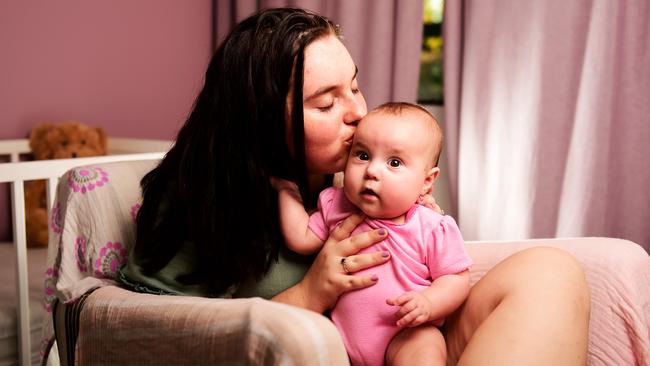
Dr Reilly said it was critical for families to stay connected and reach out for help.
“COVID-19 has brought with it a host of additional stresses and concerns for those who are pregnant or who have babies or young children at home,” Dr Reilly said.
“Many women are anxious about their health and the health of their baby, are navigating a new way of planning routine appointments and care, and have been unable to celebrate the arrival of the new baby with grandparents and friends.
“Accessing timely, appropriate support can be so important for the wellbeing of mums, dads and babies for years to come.”
NATIONAL SUPPORT
Gidget Foundation Australia: 1300 851 758
First-time mum Lauren Clayton said she was left feeling completely broken after experiencing a traumatic birth.
She knew she needed help to process nearly losing her son but didn’t know where to turn.
It wasn’t until she sat down with child health nurses at Kirwan community practice that she felt hopeful things would get better.
“I had a traumatic birth with a baby that spent time in special care and I found it extremely difficult,” Ms Clayton said.
“After six months I finally sat down with someone that specialises in postnatal welfare.
“Getting out and being social was helping me heaps but now being isolated again, I’m struggling.”
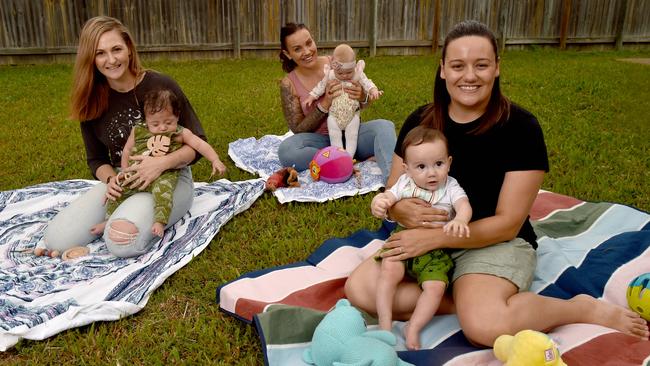
RELATED >>
COVID-19 prompts new mothers to leave quickly after birth
Union claims Townsville Hospital out of touch on midwife shortage
Expectant mothers told by Townsville Hospital they’ll be seen within 365 days
New mum praises Mater’s midwife support
Clinical psychologist Dr Emma Black of Nurture Family Health Centre said parents shouldn’t be left feeling like they should work through their feelings alone and it was really important to access professional help if symptoms persisted.
“For many mums, COVID-19 has disrupted opportunities to obtain practical support like having people come to your house to help with meals or housework, or opportunities to feel better through getting out, seeing friends and doing enjoyable activities,” she said.
“Start talking with others and let them know how you’re doing – this can reduce the feeling that you’re the only one not managing.
“Seeing a general practitioner and psychologist are great places to start accessing help.”
Townsville Hospital and Health Service acting chief executive Stephen Eaton said there was significant midwifery support in place for new mothers post-discharge.
“This includes regular access to midwives and lactation services in the first seven to 10 days,” he said. “Additionally, there are home visits by a child health nurse.”
Mr Eaton said clinics continued to operate at Kirwan for health checks, lactation, parenting and immunisation but online sessions had replaced group face-to-face sessions.
SUPPORT ACROSS TOWNSVILLE
Nurture Family Health Centre: All allied health appointments including midwifery, psychology, chiropractic and medical is available face-to-face and via telehealth.
Townsville Aboriginal and Islander Health Service (TAIHS): Antenatal appointments continue to be offered in the clinic or via telehealth. Mothers groups have been cancelled anddue to the current Pandemic, all education is provided on a one-on-one basis.
Townsville University Hospital: Mothers can now have two support people while giving birth and up to two people visiting for two hours between 8am – 8pm, once per day on the ward. Children below the age of 16 remain banned.
Kirwan Health Campus: Child health nurse home visits post birth are continuing.
Health checks, lactation, parenting and immunisation remain available at the clinic.
Face to face group education classes have been cancelled and moved online.
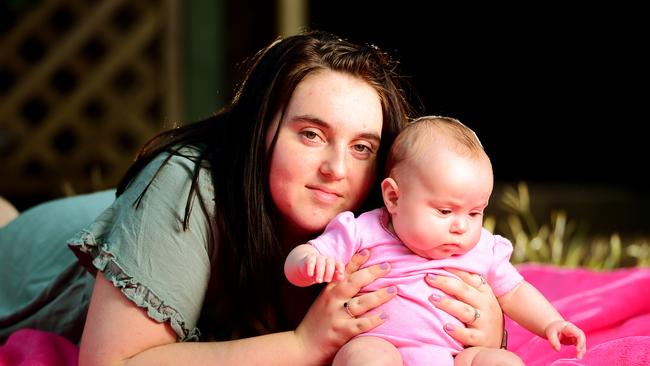

Add your comment to this story
To join the conversation, please log in. Don't have an account? Register
Join the conversation, you are commenting as Logout